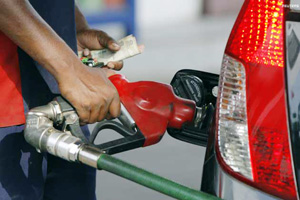New Delhi, Jan 16: Petrol price was today cut by Rs 2.42 per litre and diesel by Rs 2.25 a litre after an excise duty hike limited the benefit of global crude prices slumping to six-year low.
The reduction would have been almost double but for the government also raising excise duty by Rs 2 per litre on both petrol and diesel today.
This is the ninth straight reduction in petrol prices since August, and fifth in diesel since October.
New rates will be effective midnight tonight, Indian Oil Corp, the nation's largest fuel retailer, announced here.
In Delhi, petrol will cost Rs 58.91 a litre, the lowest in 44 months, as compared to Rs 61.33 a litre now. Similarly, diesel will cost Rs 48.26 a litre in Delhi, the lowest since April 2013, as against Rs 50.51 currently.
This is the fourth hike in excise duty since November and cumulatively customers have been denied the benefit of Rs 7.75 per litre reduction in petrol and Rs 6.50 a litre cut in diesel rates that was warranted due to the slump in oil price to USD 46 per barrel.
A Finance Ministry notification said the excise duty on unbranded petrol is being hiked to Rs 8.95 per litre and that on unbranded diesel to Rs 7.96 per litre.
The four excise duty hikes will result in about Rs 20,000 crore in additional revenue this fiscal and will help the government meet its fiscal deficit target of 4.1 per cent of the GDP.
Petrol and diesel prices were last cut on December 16 by Rs 2 per litre each.
Including today's reduction, petrol price have been cut by Rs 14.69 per litre on a cumulative basis since August, while diesel rates in five downward revisions have been slashed by a total of Rs 10.71 a litre.
Crude oil price in June was at USD 115 per barrel. The Finance Ministry notification said the excise duty hike will be effective from midnight tonight.
The government had last raised the excise duty on petrol and diesel by Rs 2 per litre each from January 2. Prior to that, the tax was hiked by Rs 1.50 a litre each from November 12 and Rs 2.25 per litre on petrol and Re 1 on diesel from December 2.
Global crude oil prices have fallen almost 50 per cent since June 2014, the most since the 2008 financial crisis, as supplies swelled.
Earlier in the day, Petroleum Minister Dharmendra Pradhan responded to criticism of oil firms not cutting despite near 4 per cent fall in global rates since January 1 saying the pricing was "not in our hands" as the both petrol and diesel have been deregulated.
"What oil companies feel appropriate they will do," he said. Along side Pradhan, B Ashok, Chairman of Indian Oil Corp, the nation's largest fuel retailer, justified the decision not to revise rates saying oil firms were saddled with huge inventory which need to be compensated.
The crude oil that is being processed currently in refineries is one that was bought about 6-8 weeks back when rates were higher than present prices. By the time, it is processed and marketed its market value would have come down, resulting in inventory losses, totalling about Rs 12,000 crore.
"There is huge drop in crude prices which is having a tremendous impact on our inventories, its a cash loss. We are paying much higher price for the crude and today we are processing the crude at a much lower price and passing it. We are taking our decision based on that and we think we have been doing the right thing," Ashok said.





Comments
Add new comment